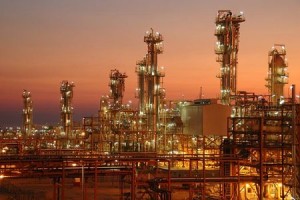 A view of Iran's South Pars Gas and Oil Field[/caption]
A view of Iran's South Pars Gas and Oil Field[/caption]The Iranian government announced this week it secured a long-term natural gas agreement with its maritime neighbors in Oman. Iranian President Hassan Rouhani vowed to lead the country as a moderate when he was sworn in to office in early August. The Iranian Oil Ministry vowed to move the country�s oil and natural gas industries closer to the international community and the gas deal with Oman was touted as a breakthrough in a deal first discussed in 2007. Officials there vowed to move quickly on infrastructure developments. Either Iran is trying to show it�s serious about engagement or its just window dressing as usual for the Islamic republic.
Iran holds the second-largest deposits of natural gas reserves in the world and most of those reserves haven�t been developed. Its offshore South Pars gas field is considered one of the largest in the world, giving Iran the claim to the No. 3 spot in terms of natural gas production. Sanctions have curtailed some developments, though even the U.S.�Energy�Department said it expects Iranian natural gas production to increase in the years to come.
Iranian Oil Minister Bijan Zanganeh said a natural gas deal was signed with his Omani counterpart Mohammed bin Hamad al-Rumhy during a recent visit to Tehran by high-ranking figures from Muscat. Zanganeh said the government would work quickly on determining the length and route for an undersea natural gas pipeline to Oman. He told the Oil Ministry�s news service, Shana, he was tasked with picking an Iranian consultant to start examining the technical and economic issues of the pipeline soon. His Omani counterpart said both sides were �very keen� on the project.
Zanganeh said he was eager to do more to ensure Iran�s oil can get to the international oil markets as well. He said the Rouhani administration is facing a wide-range of challenges �but we have to try out best to increase oil exports.�
Western sanctions on Iran are designed to starve the government of export revenue it could use tofinance�its nuclear program, which the government maintains is for peaceful purposes. Rouhani, a former nuclear negotiator, stuck to the mantra that Iran is entitled to nuclear research program but has suggested he was ready to continue working with European negotiators.
His oil minister stressed the Iranian energy sector was open to any consumer or country willing to invest in the country. �There is no limitation to that effect and we will open once more the country�s market and potentials to win their cooperation in the new phase of the petroleum industry development,� he said.
The visit to Iran by Omani delegates was considered a rare event in some circles. The United States counts Oman as a long-time ally and imports some of its crude oil. The U.S. State Department said the traditional market for oil field supplies and services in Oman should continue to develop. That means Iran would be walking, more or less, into western turf with its natural gas ambitions. Speculation surfaced during bilateral talks in Tehran that Omani delegates were carrying a U.S. message with them, though Iranian officials shrugged off the suggestion.
Two rounds of nuclear negotiations in the waning months of the Mahmoud Ahmadinejad administration resulted in few, if any, breakthroughs. The United States was accused of acting like �a jerk� in its reception of the Rouhani administration and, with the 2016 campaign right around the corner, the situation is unlikely to change. The ball seems to be therefore in Rouhani�s court � either he�s serious about leading the country out of isolation or he�s playing the game just well enough to let his adversaries think they�re winning.
By�Wall St. Cheat Sheet
The Iran Project is not responsible for the content of quoted articles.










